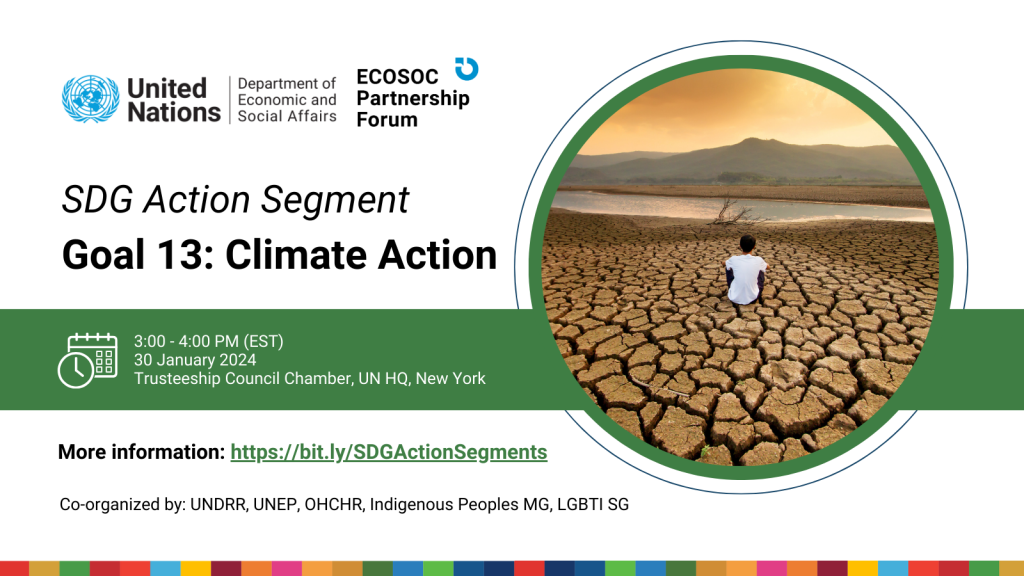Background
Watch recording
Background
Climate change poses disproportionate risks to different populations. People who are socially, economically, culturally, politically, institutionally, or otherwise marginalized are especially vulnerable to climate change (IPCC, 2014). Marginalized communities, including Indigenous Peoples and LGBTI populations, persons with disabilities, migrants, and others, face heightened vulnerability which consequently exacerbates pre-existing inequalities, negatively impacting human rights. Younger and older persons, especially those who face multiple and intersecting discrimination, also face increased exposure to risks. While marginalized groups face increased risks, they are still inadequately included in actions and partnerships aimed at addressing the climate crisis, including disaster response. People and ecosystems are inseparable. At times, solutions being implemented to address the climate crisis exacerbate the adverse impacts that Indigenous Peoples and other marginalized communities are facing brought about by development imposed in their territories. At the heart of the 2030 Agenda is the pledge to leave no one behind, with the need to centralize the poorest, most vulnerable, and those furthest behind in policies, programs and partnerships addressing the climate crisis. Special considerations for marginalized groups, communities, and ecosystems are crucial in adaptation planning and implementation.
Climate action is intrinsically linked to the 2030 Agenda for Sustainable Development and targeted partnerships can accelerate progress across multiple Sustainable Development Goals (SDGs). The 2023 United in Science Report finds that climate-resilient agricultural practices, resulting from global partnerships, led to a 20% increase in crop yields in vulnerable regions, simultaneously addressing hunger (SDG2) and climate action (SDG13). Similarly, the 2023 Global Climate Report underlined that climate action partnerships focused on low-income and marginalized communities have shown promising results in reducing inequalities (SDG10). Likewise, investments in dryland agriculture, mangrove protection, and water management that ensure the integration of the traditional knowledge and governance of affected communities will make a vital contribution to building resilience to climate change and generating benefits around four times the original investment. These 3 actions highlight the transformative potential of inclusive climate partnerships in creating a more equitable world.
Partnerships between and among governments, the private sector, educational institutions, scientific bodies, media, investors, and businesses and civil society can significantly enhance the effectiveness of climate action initiatives and climate-resilient development. These partnerships not only advance technological and financial solutions but also foster policy frameworks, across governance levels, sectors, and timeframes that are vital for sustainable development. Moreover, effective partnerships, particularly with traditionally marginalized groups play a crucial role and thrive if anchored on the respect for human rights with supportive political leadership, well-established institutions, adequate resources, including finance, and access to climate services, information, and decision support tools.
Objectives of the segment
- Highlight partnership approaches that employ innovative approaches to accelerate climate action, the implementation of the 2030 Agenda for Sustainable Development, the Paris Agreement, the Sendai Framework for Disaster Risk Reduction, the Global Biodiversity Framework, and other international agreements.
- Highlight the needs, concerns, contributions, and experiences of marginalised groups participating in and implementing climate change-related partnerships.
- Galvanize momentum towards a more inclusive, rights-based approach to partnerships on SDG13.
Organized by:
- United Nations Office for Disaster Risk Reduction (UNDRR)
- United Nations Environment Programme (UNEP)
- United Nations Office of the High Commissioner for Human Rights (OHCHR)
- Indigenous Peoples Major Group
- LGBTI Stakeholder Group
For additional questions, please contact Ms. Nehali Anupriya, UNDRR, nehali.anupriya@un.org
Concept note and programme
Summary
Participation
The SDG Action Segments are open to all in-person attendees of the ECOSOC Partnership Forum. The Segments will be available to follow along virtually on UN Web TV.

Concept Note
Summaries

